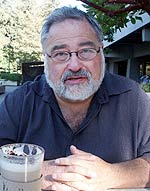George Lakoff of Berkeley is one of the giants of modern linguistics and brain sciences–an authority on neural networks, how the mind works,  and most especially how the body politic responds to words that cue frames of moral meaning. He gave me a provocative earful the other day and I post it here in two twenty-minute takes.
and most especially how the body politic responds to words that cue frames of moral meaning. He gave me a provocative earful the other day and I post it here in two twenty-minute takes.
In Part One, Lakoff exults in the Internet ventilation of political talk; its visible effect in MoveOn and the Dean campaign is “only the beginning. He maps the “naming and framing” dimensions of the California recall campaign and Arnold Schwartzenegger’s election. The “competent clerk” Gray Davis walked into a trap of deregulated energy prices and brownouts that had been contrived by the Bush White House. Arnold was no eccentric, in Lakoff terms, but the modern machine Republican, the embodiment of “individual discipline in a difficult, dangerous world… a strict leader who’s got moral authority to protect you. Who better than the Terminator?” And then Lakoff picks his way through the mostly disguised meanings and motives around the Iraq war.
In Part Two, I begin with the paradox of our times: that we are learning to live with both an information revolution and a culture of propaganda. “What the Right has done,” Lakoff answered, “is create a populist art form known as the rant.” He laments the lost language of world leadership: who makes good use these days of key words like fairness, freedom, trust, cooperation, treaty obligations, the values of the United Nations charter, respect, competence, responsibility and openness? Lakoff sets Howard Dean’s language and body-language in the Harry Truman tradition. Dean is “forceful, serious, honest–not namby-pamby.” He thinks that a medical doctor makes “a very good messenger.” He wishes Dean would campaign in the South around doctor’s visits to Veterans Hospitals. “Talk to the patients and the doctors there about what it means to fight in a war–about what happens to you… and what happens to the other people you see.” Lakoff thinks Dean and the Democrats in general are “not there yet.”
George Lakoff is a devout progressive with cold comfort for liberals. Conservatives, he says, have won the fight over political language. It’s a central argument of Lakoff’s book Moral Politics that for the last 30 years, left-wing foundations have been doing what comes naturally, “helping people who need help,” while right-wing foundations have put a network of thinkers and writers to work honing symbolic phrases like “tort reform” and “tax relief.” Even with Al Franken on your side, there is no winning an argument around “tax relief” that sounds like mercy and justice for the afflicted. “If you use their language,” Lakoff said, “you use their mode of thought; you use the way they think about the world.” It is the work of Lakoff’s Rockridge Institute to assemble the cognitive scientists and media masters to build a fresh language of progressive ideas.
Lakoff thinks it’s a 5-year assignment. I wonder why it should be so complicated or so long. Listen to our argument here. And look for yourself, please, at the December Atlantic Monthly. The cover story, “Tour of Duty,” is taken from John Kerry’s war diaries and letters home from Vietnam 35 years ago. For example:
“Wherever I went and young Vietnamese men would look at me I grew scared. There really was no way to tell who was who. You could be in a room with one and not know whether he was really a Charlie or not… Whom did you begin to trust and where did you draw the line. Another ludicrous aspect of the war.”
On the death of a close friend from Yale, Dick Pershing, grandson of the US Army legend in World War I, “Black Jack” Pershing, Kerry wrote: “Then I just… cried–a pathetic and very empty kind of crying that turned into anger and bitterness. I have never felt so void of feeling before–so numb.”
The closer Kerry came to fighting and death, the more absurd everything felt, as on the night when his Swift boat escorted the Vietnamese mercenaries, mostly ex-Viet Cong, who blew away four evidently defenseless people in a sampan. Kerry wrote about facing a young woman who survived: “I felt a certain sense of guilt, shame, sorrow, remorse–something inexplicable about the way they were shot and about the predicament of the girl… I hated all of us for the situation which stripped people of their self-respect.”
To his future wife, Judy Thorne, Kerry wrote home: “Judy, if I do nothing else in my life I will never stop trying to bring to people the conviction of how wasteful and asinine is a human expenditure of this kind.”
George Lakoff argues that in America today “there is not a publicly acceptable language of opposition to war.” I don’t believe him. John Kerry named it and framed it in 1968. Yet Kerry seems to have brought none of the hard lessons of Vietnam to bear on the neo-imperial folly that has boobytrapped American troops in Iraq. A renewed American conversation today needs candor and courage more than cognitive science. If John Kerry had addressed Iraq on the Senate floor with the simple heart of his letters home from war, if he’d remembered what he’d written, he–and we–might have been spared the mess we’re all in now.
2003 11 24
{ 19 } Comments